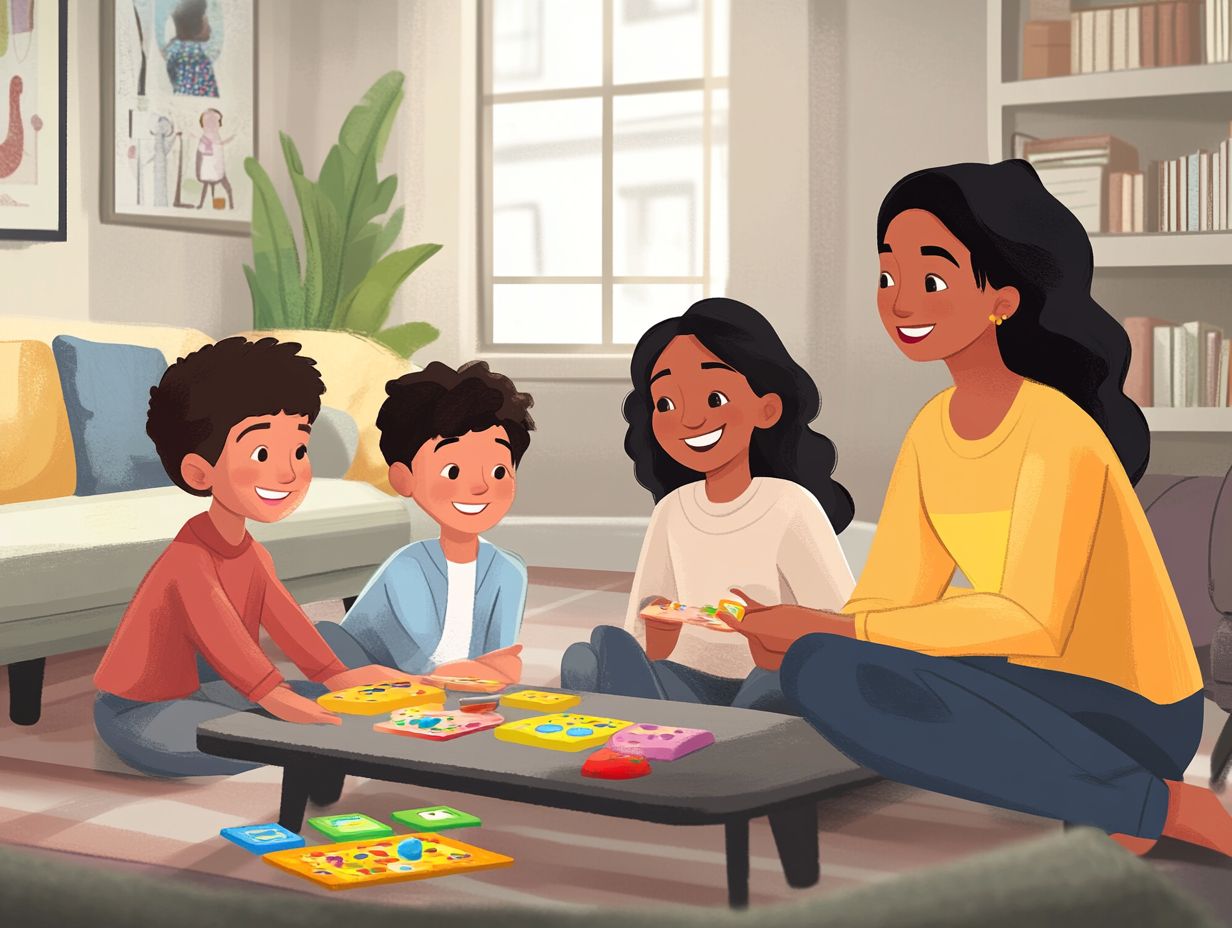5 Emotional Awareness Games for the Family
Contents
- 5 Emotional Awareness Games for the Family
- Key Takeaways:
- 1. The Emotion Charades
- 2. Feelings Scavenger Hunt
- 3. Emotion Matching Game
- 4. Emotion Word Association
- 5. Role-Playing Emotional Situations
- How Can Emotional Awareness Games Benefit Families?
- What Are Some Other Creative Ways to Teach Emotional Awareness?
- How Can Emotional Awareness Help Improve Family Dynamics?
- What Are Some Common Barriers to Emotional Awareness in Families?
- How Can Families Continue to Practice Emotional Awareness in Daily Life?
- What Are Some Tips for Choosing the Right Emotional Awareness Games for Your Family?
- Frequently Asked Questions
- What are some examples of emotional awareness games for the family?
- How can playing emotional awareness games benefit my family?
- Do I need any special materials to play these games?
- Can these games be adapted for different age groups?
- How often should we play these games as a family?
- Are these games suitable for all types of families?
5 Emotional Awareness Games for the Family
Emotional awareness plays a crucial role in creating healthy family dynamics. It often slips through the cracks amid daily chaos.
As children develop self-awareness, self-management, and social awareness, emotional awareness becomes even more important.
Discover five fun games that will help your family connect emotionally while having a blast. Activities like Emotion Charades and Feelings Scavenger Hunts promote open communication and understanding.
We will explore the benefits of emotional awareness, offer tips for overcoming barriers, and suggest ways to integrate these practices into your daily routine. Expect conversation starters and positive coping mechanisms that will transform your family interactions into something extraordinary!
Key Takeaways:

- Emotionally aware families can benefit from playing games like charades and scavenger hunts.
- These games foster emotional intelligence and understanding of social cues.
- Incorporate these games and board games into your routines for healthier social interactions.
1. The Emotion Charades
The Emotion Charades is a vibrant game designed to enhance social emotional learning (SEL) for children. It provides an interactive platform to express and understand emotions while having fun.
This game hones emotional skills and promotes teamwork, self-awareness, and recognition of social cues. It’s ideal for family bonding and meaningful emotional exploration.
In each round, you take turns acting out various emotions without speaking. This challenge ignites lively discussions about emotional expression.
Through this playful exchange, you expand your emotional vocabulary and learn to manage your impulses. As you observe friends’ expressions, you practice empathy and build deeper connections.
2. Feelings Scavenger Hunt
The Feelings Scavenger Hunt is an exciting game that encourages children to explore their emotional needs. They search for items representing different feelings.
Create a list of emotions for the children to find items around the house or yard. For example, they might find a favorite toy for ‘joy’ and an old family photo for ‘sadness.’
This activity prompts children to reflect on their feelings and opens the door to meaningful conversations. Sharing reasons behind their chosen items fosters stronger family bonds and enhances emotional literacy.
3. Emotion Matching Game
The Emotion Matching Game offers a captivating way for you to help children enhance their emotional intelligence by matching various emotions with corresponding facial expressions or situations. This engaging activity give the power tos kids to thrive in social interactions and develop a rich emotional vocabulary.
As they play, children will encounter emotions like joy, anger, sadness, and surprise, which invites them to delve into their own feelings as well as those of others. This interactive experience encourages them to articulate their thoughts and emotions, fostering a culture of open communication.
By learning to recognize and understand these emotions, children are refining their emotional skills and becoming more empathetic individuals. The game also serves as a valuable resource for parents and caregivers, providing opportunities to engage in meaningful discussions about emotions and teach healthy coping strategies. Ultimately, this game creates an enriching environment where emotional growth and positive behavior can truly flourish.
4. Emotion Word Association

Emotion Word Association is an engaging and creative game that invites you to help children connect various emotions with words or phrases. This not only fosters their emotional expression but also enhances their ability to articulate feelings, all while promoting positive coping mechanisms, responsible decision-making, and strengthening family bonds.
In this game, you can take turns with the little ones, starting with an emotion like “happy.” Then, another player responds with a word or phrase that resonates with that feeling perhaps “ice cream” or “birthday party.” As the game unfolds, children can dive deeper into discussions about their associations, creating opportunities for them to share personal experiences. For instance, if someone mentions “sad,” another child might chime in with “rainy days,” sparking conversations that allow them to articulate their feelings and develop empathy for others’ emotional experiences.
By participating in this playful activity, children not only expand their emotional vocabulary but also gain valuable insights into themselves and their peers. This ultimately strengthens their interpersonal skills and cultivates a supportive atmosphere within the group.
5. Role-Playing Emotional Situations
Role-playing emotional situations offers you a powerful tool to help children navigate the intricate world of emotions. By acting out various scenarios, they can practice empathy, explore their emotional needs, and enhance their problem-solving skills in a safe and supportive setting.
Through engaging in different role-playing scenarios like resolving conflicts with friends, managing feelings of jealousy, or handling the challenges of change children gain invaluable insights into emotional dynamics. Each scenario is crafted with clear objectives, such as fostering communication skills, encouraging compromise, and building resilience. This interactive method not only nurtures teamwork among peers but also creates a space for children to express their feelings and thoughts openly.
As they dive into these imaginative exercises, they learn to recognize their own emotions and respond to others with greater understanding. This ultimately promotes emotional intelligence, stability, and emotional resilience in their everyday interactions, equipping them with the skills to navigate life’s emotional landscapes with confidence.
How Can Emotional Awareness Games Benefit Families?
Emotional awareness games are an invaluable resource for families, serving to enhance learning about feelings and relationships and emotional skills. They create opportunities for family activities that significantly contribute to emotional well-being, positive behavior, and stronger connections through shared experiences. Activities like reading books and having family movie nights also play a role in this emotional growth.
These interactive sessions invite you and your family members to express yourselves authentically and engage in active listening, thereby refining the communication skills essential for fostering mutual understanding. As you navigate various scenarios within these games, you’ll learn to identify feelings, cultivating emotional resilience that prepares you to tackle real-life challenges with greater efficacy.
The collaborative essence of these activities fosters problem-solving abilities, allowing you and your family to brainstorm solutions together, think critically, and resolve conflicts all while maintaining a supportive and nurturing atmosphere.
What Are Some Other Creative Ways to Teach Emotional Awareness?
You ll discover a wealth of creative methods to teach emotional awareness that go beyond traditional games. Consider incorporating mindfulness activities and engaging in creative pursuits like arts and crafts; these not only enhance emotional intelligence but also invite children to explore their feelings in a safe space. Community gardening and team sports also provide platforms for kids to connect with others and learn responsibility.
Storytelling is an exciting way to help children explore emotions! As they connect with characters and their experiences, their understanding of diverse perspectives expands, enriching their emotional vocabulary and enhancing their social interactions.
Community gardening presents a hands-on approach, allowing kids to learn the art of nurturing plants while collaborating with peers. This shared experience cultivates empathy and responsibility in a way that is both enjoyable and impactful.
Team sports also provide valuable lessons on teamwork and teach children how to gracefully navigate both victory and defeat.
These enriching activities forge meaningful connections among peers and encourage healthy emotional expression, ultimately equipping children with the essential skills needed to navigate their emotional experiences in everyday life. Through these activities, kids understand the importance of emotional regulation and empathy.
How Can Emotional Awareness Help Improve Family Dynamics?

Emotional awareness equips families with essential tools to enhance relationship skills and responsible decision-making. When families engage in fun games and creative activities like those discussed, they build a foundation for better communication and understanding.
Fostering emotional awareness within your family can significantly enhance your family dynamics. By cultivating emotional intelligence and social awareness, you enable better social interactions and foster empathy among family members, ultimately leading to more harmonious relationships.
When you and your family understand your own emotions as well as those of each other, communication becomes much more effective, which is essential during times of conflict. Instead of reacting with frustration during disagreements, you can opt for open dialogues where each person expresses their feelings and seeks to understand one another s perspectives. This can be helped by using conversation starters and other emotional skills. This approach not only aids in resolving conflicts but also builds a foundation of trust.
To incorporate these emotional skills into your daily life, consider setting aside time for sharing experiences, using ‘feelings’ charts to help younger members articulate their emotions, and engaging everyone in activities that promote cooperation and empathy, such as family activities like team sports or community gardening. Don’t wait! Start incorporating these activities today to transform your family dynamics!
These practices enrich individual growth and strengthen your family’s bond.
Explore our resources for more emotional awareness activities!
What Are Some Common Barriers to Emotional Awareness in Families?
Common barriers to emotional awareness in families often stem from emotional obstacles such as a lack of communication, fear of expressing feelings, and societal stigmas surrounding emotional well-being and other emotional needs. These factors can significantly hinder open discussions about emotions and personal needs.
These barriers prevent you from expressing your feelings freely. They can also create a cycle of misunderstanding and resentment within the family dynamic, hindering healthy social and emotional interactions.
For example, when family members fear the repercussions of vulnerability, they often choose silence, allowing unaddressed emotions to accumulate.
To tackle these issues, it’s essential for families to build trust. Establishing regular check-ins can create a safe space where everyone is encouraged to share their thoughts and feelings without fear of judgment. Utilizing creative activities and positive coping strategies can further support this process.
Educating family members about emotional health and self-awareness can help dismantle harmful stigmas. This education makes it easier for everyone to engage in meaningful conversations about their emotional experiences.
How Can Families Continue to Practice Emotional Awareness in Daily Life?
Make emotional awareness a fun part of your everyday life by integrating emotional skills, self-management, and self-regulation into your routine activities. Consider using mindfulness techniques during family meals and engaging in meaningful conversations about feelings.
Participating in emotional experiences together helps foster a supportive environment. Here, every family member feels comfortable expressing their thoughts and emotions.
Setting aside dedicated time each week for family check-ins helps everyone articulate their feelings and perspectives in a safe space, aiding emotional exploration and resilience.
Incorporating activities like storytelling, reading books, or sharing personal highlights and challenges can deepen connections. This can also enhance emotional literacy within your family.
Utilizing visual aids, such as emotion charts and emotional vocabulary aids, can be particularly helpful for younger children. These tools serve as prompts to identify and communicate their feelings.
By consistently creating opportunities for emotional expression, such as role-playing and shared experiences, you can cultivate resilience and understanding among your family members.
What Are Some Tips for Choosing the Right Emotional Awareness Games for Your Family?
Choosing the right emotional awareness games for your family requires thoughtful consideration of several factors. Consider your children’s ages, the specific emotional skills you wish to cultivate, and the types of interactive games that foster emotional intelligence and engagement.
Finding the perfect balance between fun and educational content is crucial. Select games that cater to various developmental stages, such as Monopoly, Pictionary, Charades, and Candy Land, to enhance their effectiveness.
For younger children, games like ‘Emotions Charades’ are excellent for encouraging the expression of common feelings while helping them learn to recognize emotions in others. For older kids, ‘The Empathy Game’ facilitates deeper discussions around emotional situations and perspectives.
Additionally, creative activities and team sports can further aid in emotional development. You might also want to explore storytelling activities, where each family member contributes to a narrative, promoting creative expression and enabling more complex emotional exploration.
Choosing games with adjustable difficulty levels ensures that everyone stays engaged and challenged according to their unique capabilities. This approach enhances their problem-solving abilities.
Frequently Asked Questions

What are some examples of emotional awareness games for the family?
Some examples of emotional awareness games for the family include “Feelings Charades,” “Emotion Scavenger Hunt,” “Emotion Matching Game,” “Emotion Role Playing,” “Guion the Lion,” “Emotional Warriors Card Game,” “Emotional Stones,” and “Emotion Memory Game.”
Try out these games and share your experiences with emotional awareness practices to help strengthen your family’s connections!
How can playing emotional awareness games benefit my family?
Emotional awareness games benefit families by improving communication and fostering empathy. They also promote emotional intelligence, enhance learning about feelings, and create a safe space to express emotions.
Do I need any special materials to play these games?
No special materials are needed. Most games can be played with simple items from around the house, like paper and pens. Some games might use emotion cards, which can easily be homemade.
Can these games be adapted for different age groups?
Yes, these games can be tailored to different ages. For example, younger children may enjoy simpler games, while older kids and adults can handle more complex challenges.
How often should we play these games as a family?
Aim to play these games at least once a week for the best results! Regular sessions, like weekly family nights, build emotional awareness and strengthen relationships.
Are these games suitable for all types of families?
Absolutely! These games are perfect for any family, regardless of age or size. They offer a fun way to connect, communicate, and help children develop important skills like self-awareness and responsible decision-making.






